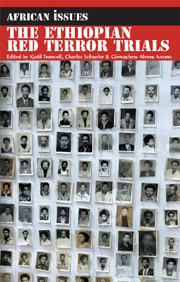Book contents
- Frontmatter
- Contents
- Notes on Contributors
- Preface
- Acknowledgements
- Abbreviations
- Glossary of Amharic Phrases
- 1 The ‘Red Terror’ Trials
- 2 The History of the Red Terror
- 3 The Rights of the Accused
- 4 The Role of the Special Prosecutor's Office
- 5 The Red Terror Trials versus Traditions of Restorative Justice in Ethiopia
- 6 A Quest for Justice or the Construction of Political Legitimacy?
- 7 Building State & Nation
- 8 Beyond the Red Terror Trials
- 9 Concluding the Main Red Terror Trial
- Index
9 - Concluding the Main Red Terror Trial
Special Prosecutor v. Colonel Mengistu Hailemariam et al.
Published online by Cambridge University Press: 12 September 2012
- Frontmatter
- Contents
- Notes on Contributors
- Preface
- Acknowledgements
- Abbreviations
- Glossary of Amharic Phrases
- 1 The ‘Red Terror’ Trials
- 2 The History of the Red Terror
- 3 The Rights of the Accused
- 4 The Role of the Special Prosecutor's Office
- 5 The Red Terror Trials versus Traditions of Restorative Justice in Ethiopia
- 6 A Quest for Justice or the Construction of Political Legitimacy?
- 7 Building State & Nation
- 8 Beyond the Red Terror Trials
- 9 Concluding the Main Red Terror Trial
- Index
Summary
Introduction
The Federal High Court issued its final verdict in the main Red Terror trial in the case Special Prosecutor v. Colonel Mengistu Hailemariam et al. on 12 December 2006. A total of fifty-five top officials of the Derg-WPE government were convicted and sentenced. Twenty-two of the top officials – including Colonel Mengistu Hailemariam, the military leader of the Derg and former Ethiopian head of state 1977–91 – were convicted in absentia. To an extent the verdict and sentencing test the efficacy of the judicial process in Ethiopia and offer a unique contribution to the discourse on transitional justice. The main Red Terror trial was tried in Ethiopia, based on the 1957 Ethiopian Penal Code, argued in court by Ethiopian prosecutors and defence lawyers, and judged by three Ethiopian judges. As outlined in Chapter 4, beyond some initial legal advice and technical assistance – related mainly to developing a computer data base for all the atrocities committed in the 1970s – there was minimal foreign influence on the legal proceedings. The contribution of the Ethiopian Red Terror trials to transitional justice is predicated precisely on their autochthonous nature.
Transitional justice, a term coined to depict societal attempts to account for atrocities committed against people or social groups in the past, basically divides into two camps: retributive justice and restorative justice. Retributive justice emphasizes a punitive element; however, since the Nuremberg trial most trials have been conducted by non-nationals in international courts, by lawyers and judges unfamiliar with the cultural and historical situation, in court rooms far removed from the country in question.
- Type
- Chapter
- Information
- The Ethiopian Red Terror TrialsTransitional Justice Challenged, pp. 136 - 152Publisher: Boydell & BrewerPrint publication year: 2009



